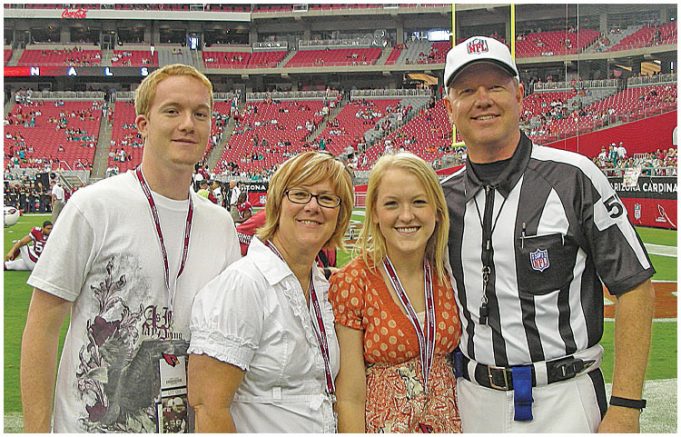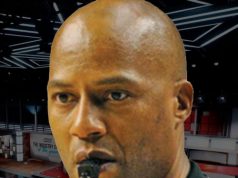To Carl Cheffers, officiating has always been a family affair.
From being introduced to the avocation by his father, who had an impressive career as an official. To picking up a whistle himself as a cash-strapped college student, and meeting his future wife in the process. To working his way up the ladder, supported by men who had officiated with and for his dad. To becoming one of the most respected officials in the NFL, while making time to help others pursue their own officiating ambitions.
It’s fair to say Cheffers wants those in his circle to embrace and enjoy officiating as much as he does.
“There’s too much pressure, too much work, not to have fun doing it,” he said. “It’s a lot more fun if you do a good job, so that’s kind of our goal, to do a good job and that allows us to have some fun.”
Cheffers’ journey began at the knee of his father, Jim, a high school teacher and coach. The elder Cheffers, who was required to stop coaching when he took an administrative post with the Los Angeles Unified School District, took up officiating. He worked his way up the ladder and spent 13 years in what was then the Pac-8 Conference.
“I got to go to his games,” Carl said. “I got to go to one of his Pac-8 games every year on an airplane and hang out with his buddies. So I was obviously brought up in sports and brought up in officiating.”
Cheffers was a high school athlete but realized he would have to find another role if he wanted to stay actively involved in sports. By that time, his father had reached the Pac-8’s mandatory retirement age of 55 and was now assigning officials.
When Carl enrolled at the University of California-Irvine he started competing in intramural sports. He also started officiating to make some spending money.
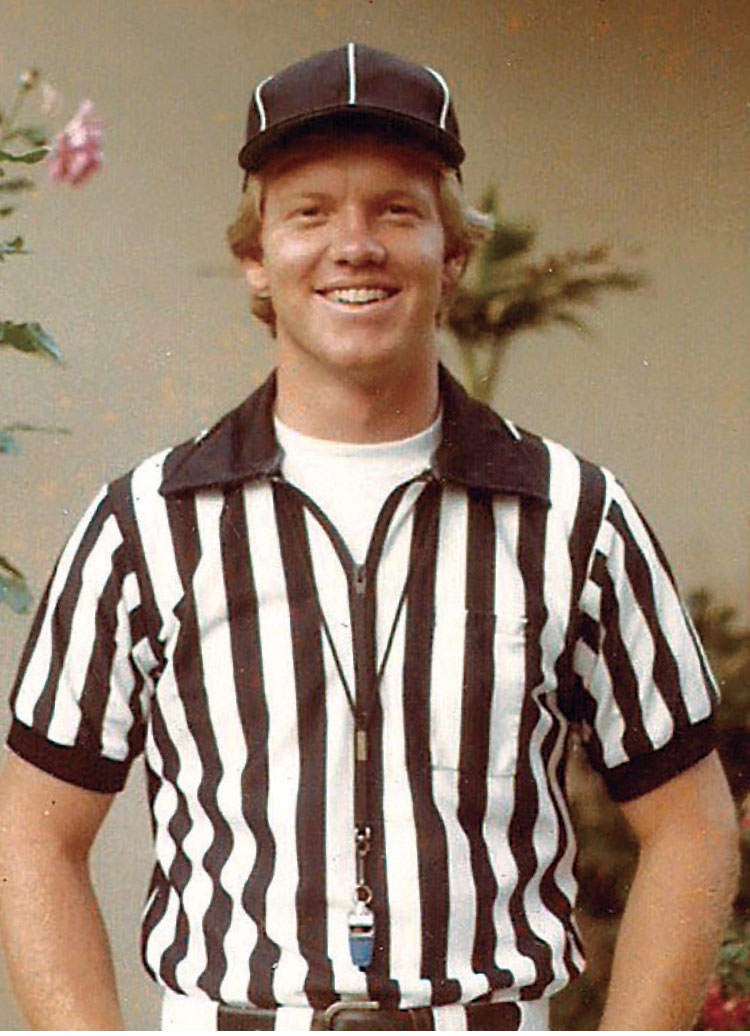
“When I walked in the door, they said, ‘Here is your assignment for the day,’” he said. “Primarily football, softball, basketball, (but) whatever they had going we pretty much did it as student officials.”
Cheffers thought it wise to befriend the young woman who doled out the daily assignments.
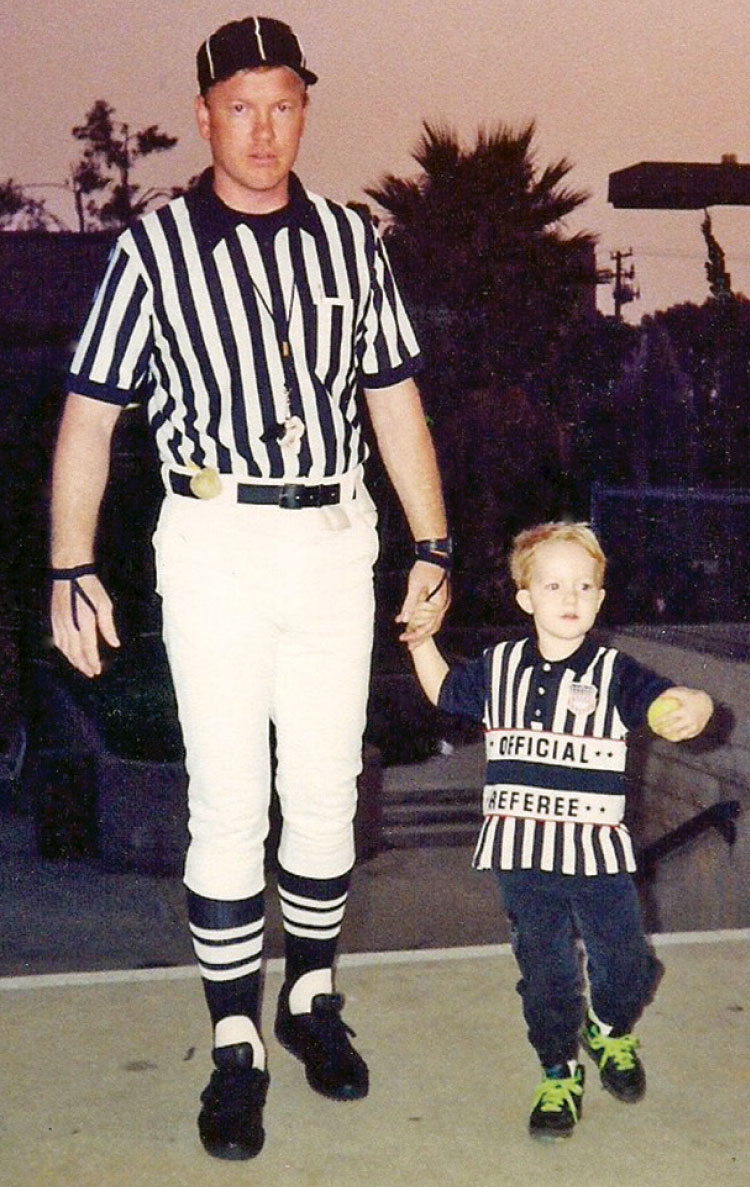
“I worked in the recreation department,” Nanette Cheffers said, “and scheduled the intramural sports. (Carl) probably did come in to ply me for a good schedule.”
Carl and Nannette have been married 35 years. “She’s still supervising my officiating career,” Carl said.
The couple have two grown children: daughter, Melissa, and son, Ben, who works football in the Big Sky Conference.
Halfway through college, Cheffers approached his father about working high school games in Los Angeles and got reacquainted with some of the same people he had met years before when he was attending his father’s games. “All those people that I grew up with are the ones that shepherded me along,” he said.
When Cheffers started working games, his father might appear, perhaps accompanied by one or more of his officiating friends.
“You just never knew who was going to show up on the sidelines at one of my very early games,” Cheffers said.
When he moved to Long Beach after graduating from UC Irvine, Cheffers joined a crew and found himself supported by a new group of mentors.
“My dad had helped a lot of guys with their careers,” he said, “whether counseling them, helping them and critiquing them on the field, being their assigner or whatever. He knew a lot of people. A lot of people admired and respected him. He had kind of paid it forward, so when I showed an interest in officiating, all these guys, when I ran across them, they all invested in me.”
Jim Cheffers became his son’s most steadfast supporter. “He never missed a game,” Cheffers said. “That was just time that he and I got to spend together every week.
“I can picture his image to this day with his Ford Cobra windbreaker, and a clipboard and a Thermos of coffee and a hat on. He never missed a game and the guys on our crew definitely got a few minutes of constructive feedback after every single game.”
Cheffers eventually added junior college and NCAA Division III games to his schedule. By that time, he was working three or four games each weekend, primarily as a referee.
In 1995, Cheffers moved into the major college ranks when he worked a half schedule in what was then the Pac-10 as a head linesman.
By that point, Cheffers was already on the NFL’s radar. He had been encouraged to apply to the league a couple of years earlier, with the understanding it would be some time before he was considered for selection.
In early 1999 he was contacted by NFL Supervisor of Officials Mike Pereira, who at the time was in charge of NFL Europe under Jerry Seeman, the NFL’s senior director of officiating, and asked to go to NFL Europe to work as a side judge. Cheffers accepted the offer but his first trip to Europe that spring was tinged with sadness. His father was losing his battle with cancer.
“The day of my flight to Barcelona (Spain) for my first NFL Europe game, my father was in the hospital and not doing well,” he said. “I called up my mom and sister and said, ‘Dad’s clearly not going to make it. Do you want me to stay here or should I go to Barcelona?’ And basically, my mom said, ‘If you don’t get on that plane to Barcelona, he will have some sort of miraculous recovery and will knock you into the middle of next week.’
“So off I went, knowing that was probably going to be the last time I saw my father alive,” Cheffers said. “Sure enough, when I got to Barcelona, there was a message waiting for me at the front desk that my father had passed away.”
Cheffers went on to work that season’s World Bowl, the World League’s championship game, before embarking on a collegiate season that saw him work a half schedule in the Pac-10 and a half schedule in the Western Athletic Conference (WAC). The WAC assignments proved to be extremely significant.
“Without those five games in the WAC, I would not have had a full Division I schedule,” Cheffers said, “and the NFL would not have considered me for being hired, not in (the 2000 season).
Cheffers worked NFL Europe again the following spring and was preparing for his upcoming college season when he got a call from Seeman, inviting him to join the staff.
“I couldn’t really answer his question at that time,” Cheffers said, “because I was too emotional. But I eventually said yes.”
Cheffers was assigned to Larry Nemmers’ crew. It marked the start of a friendship that continues to this day. “I was the luckiest guy in the world,” Cheffers said. “Larry is one of the best people on Earth and certainly gave me a lot of counseling and instruction and mentoring, and everything else.”
Cheffers made his regular-season NFL debut Sept. 3, 2000, at Arrowhead Stadium in Kansas City. Just before the opening kickoff, Nemmers gave his crewmate a moment to remember.
“We’re ready to go,” Cheffers said, “and I’m the side judge so I’m way up on the 45 yardline, on the sideline ready to go. Of course, I’m nervous, excited. It’s Kansas City. So it’s loud and full of energy, and everything else. And Larry comes running up all the way from the goalline. He comes 60 yards up the field right at me and I’m thinking, ‘Oh God, what did I do already?’
“So, he comes up and he says, ‘Look up in the sky.’ And I’m kind of thinking there’s a flyover or something I missed,” Cheffers said. “And I look up and he said, ‘Your dad is watching you.’ He takes off and runs back to the goalline. The emotion of the moment is overwhelming and I’m trying to get composed for the kickoff and everything else.
“It was just a great memory, a great way to start off my NFL career, and that’s just the kind of guy that Larry is to make sure that my dad was included in my first NFL game, my first play.”
Nemmers cites Cheffers’ professionalism and confidence from the moment he joined the crew. “You have to have that air about you as an official,” he said. “Not arrogance, but confidence.”
Cheffers spent eight years as the side judge on Nemmers’ crew. He also continued to work NFL Europe games for eight seasons, three as a side judge and five as a referee. For several years, he was also designated the alternate referee on Nemmers’ crew in the event of an emergency.
“That means he went to the coaches before the game,” Nemmers said. “Carl would always be with me. We’d walk around the field together.”
When Nemmers retired before the 2008 season, Cheffers took over as the referee on the crew. “When he stepped in, he was ready to go,” Nemmers said.
Jerry Markbreit was the NFL’s referee trainer at that time. He and Cheffers first met when the 11-year-old Cheffers attended the 1972 Rose Bowl his father worked alongside Markbreit, who was the referee. It was the only bowl game Markbreit ever worked.
“When he first came in (after being named to head Nemmers’ crew), I asked him, ‘Are you related to Jim Cheffers?’” Markbreit said. “He said, ‘That’s my dad.’ So we kind of connected right there.”
After working five playoff games as a side judge, Cheffers received his first postseason assignment as a referee following the 2009 season. He served as the alternate referee for Super Bowl XLIX before being named to work Super Bowl LI between New England and Atlanta in February 2017. He refereed his second Super Bowl to conclude last season, his 21st in the NFL.
Markbreit says Cheffers’ background made him a good fit for the referee’s role. “He’s just as solid as any guy I’ve ever worked with as far as being a referee,” he said. “He’s a manager in his business life. He’s very intelligent, works well with people and demands respect because he carries himself on and off the field the way you would expect somebody with dignity to act.”
Both of Cheffers’ parents were teachers. He believes growing up in that environment enhanced his own people-management skills.
“I didn’t go that direction from a professional standpoint,” he said, “but I am a teacher deep down inside and I think I can say humbly, people like being on my crew. They know I’m going to do everything I can to help them hit their full potential and I am fully invested in them. I will do anything I can to help them be successful and we are going to have very comprehensive, structured pregames every single week.”
Cheffers prides himself on his ability to mentor officials who are new to his crew and/or the NFL and help them adapt to professional football and their new responsibilities.
“I love to reach young officials,” he said, “and I hold them accountable for doing their part. Most people respect that because I’m putting in the time too. After 21 years, I have a little bit of a track record of success. That’s one of the things I’m most proud of and one of the things I continue to challenge myself on, ensuring that all of us get better and that’s including me; I’ve got to do my part.”
Throughout his career, at whatever level he was working, Cheffers has made sure to remember and credit those who came before him and took the time to encourage, mentor and critique him.
“I always say a prayer before every single game,” he said, “and I thank all the people who have invested in me. I use that term very intentionally because, just like anything else you invest in, whether it’s your home, a car, the stock market, a 401K plan or whatever you invest in, you expect a return.
“There’s a long list of people that invested in me, gave part of themselves to me. And without those people, I would not be here. So it’s incumbent upon me to show them a return on their investment. That’s really one of the things that drives me, ensuring they see a good return on the investment they have willingly made in me.”
As if to repay the kindness of others, Cheffers has retained membership in the Long Beach unit of the California Football Officials Association. He recalls a comment from Fred Gallagher, a longtime mentor and family friend, after Cheffers was hired by the Pac-10. “He didn’t say ‘Whoa,’ or anything like that,” Cheffers said. “He said, ‘Good job, kid. Now, who are you going to mentor to replace you?’
“That’s pretty much how I grew up. That culture I grew up in is reaching back and pulling up the next person. That’s my DNA. I’m super lucky that all those people decided that I was somebody they wanted to give their time and resources to.”
One of the people he encouraged was his own son, Ben, who is now a back judge in the Big Sky Conference, a position his father thought was perfect for him because, “I don’t know anything about being a back judge.”
Cheffers was determined not to push his son into officiating. “I could never live with myself doing that,” he said. But he delights in how his colleagues helped introduce Ben to the avocation.
“That to me is one of the most rewarding things I’ve ever seen and ever experienced in my officiating career,” he said, “watching my friends help my kid become an official. They did everything they could to give him the opportunity to be successful.”
For his part, Ben Cheffers is grateful to the men who have supported his officiating ambitions. “I’ve been so fortunate to have some really influential and knowledgeable people take an interest in my career and offer to help me along the way,” he said. “One of the best ways to learn is from experience and I’ve been so blessed to have a wealth of people with many years of experience pass on their expertise to me. My dad, of course, has taken a special interest in my officiating. He is a great resource to have when I run into new situations or rules questions.”
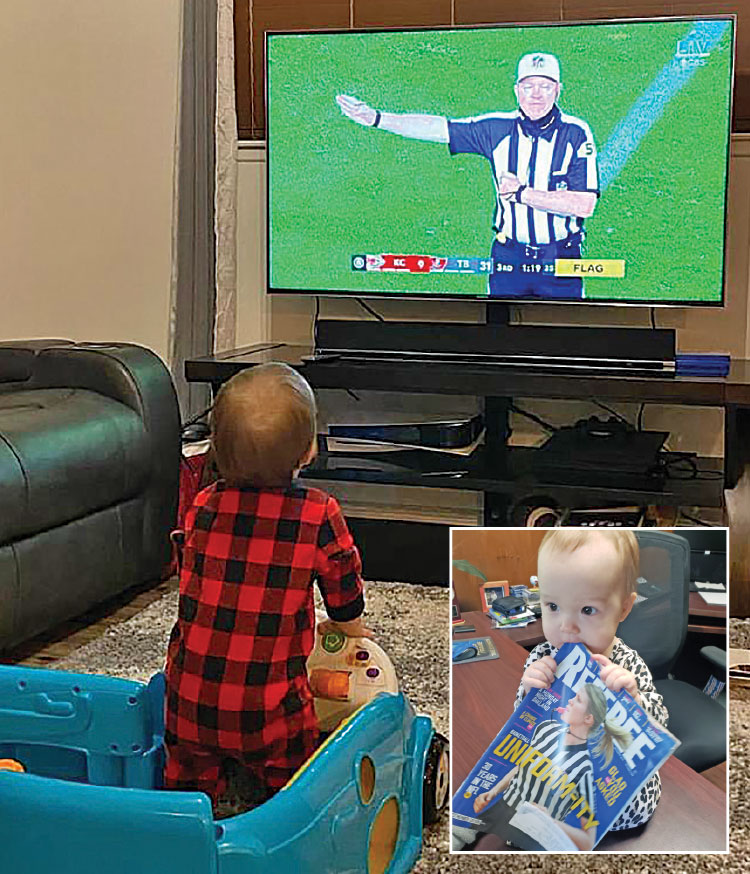
Ben Cheffers is impressed by how respected his father is as a man. “I have never had anyone ever come to me and speak negatively about my dad’s character or personality,” he said. “I could not tell you how many times someone has come up to me and said, ‘Hey, your dad told me (something) at a clinic five years ago and I still use it to this day.’
“I really believe that others are so willing to help me because my dad treats people this way and goes out of his way to help them.”
The 61-year-old Cheffers isn’t sure how much longer he wants to be on the field. His full-time job for a company that manufactures automobile batteries keeps him busy and he also occupies himself with other hobbies. He is active with the Boys and Girls Club and he and Nanette volunteer their time with the theater group at the high school their son and their daughter, a professional actress, attended.
Nanette Cheffers lauds her husband’s ability to juggle his responsibilities. “He is extremely disciplined and he’s extremely focused,” she said. “When he puts his mind to what he wants to do, he works at it until he accomplishes it.
“The other part of it is, he’s able to look at a situation and immediately access pretty accurately what the situation is and what it demands. That skill is obviously necessary on the field and it serves him well in his full-time job as well as his volunteer activities he’s involved in, and also serves him well for our family.”
Through it all, Cheffers remains passionate about officiating.
“I don’t have a complete long-term plan that, ‘This is going to be the drop-dead date when I retire,’” he said. “I don’t want to stay a year too long. I’m still thoroughly enjoying it. I still feel like I have a lot to give. Obviously, the league thinks I’m doing a pretty good job, so I am definitely planning to keep going for a few years yet. But that’s really a year-by-year thing. A lot changes at my age from year to year.”
What's Your Call? Leave a Comment:
Note: This article is archival in nature. Rules, interpretations, mechanics, philosophies and other information may or may not be correct for the current year.
This article is the copyright of ©Referee Enterprises, Inc., and may not be republished in whole or in part online, in print or in any capacity without expressed written permission from Referee. The article is made available for educational use by individuals.

